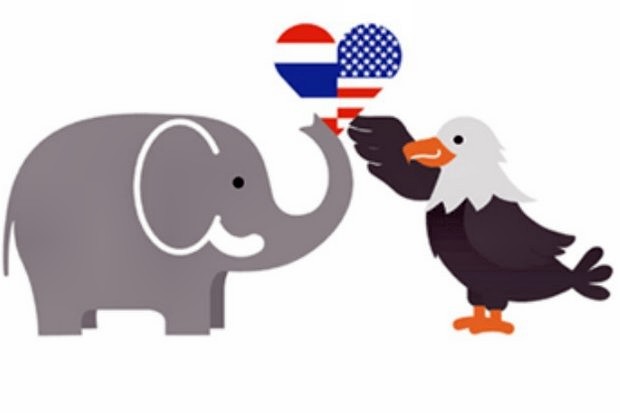
Soon after the Asean Summit in April, United States President Donald J Trump placed phone calls to three Southeast Asian leaders and invited them to the White House.
Of the three, Prime Minister Prayut Chan-o-cha accepted immediately, whereas Philippine President Rodrigo Duterte's and Singaporean Prime Minister Lee Hsien Loong's responses were more guarded and considered. As preparations are reportedly under way for the Thai leader to visit the White House as early as next month, Thai-US relations appear to be on the move. This apparent thaw in the bilateral alliance comes with potential rewards as well as risks, and should be put in context for Thailand's own leverage and national interests.

Thitinan Pongsudhirak is associate professor and director of the Institute of Security and International Studies, Faculty of Political Science, Chulalongkorn University.
To understand Mr Trump's phone invitation, it is necessary to recall the tenure of his predecessor, Barack Obama. Widely respected for his intellect, integrity and international outlook, Mr Obama staunchly supported the rules-based liberal global order that was constructed after the World War II, eventually leading to such landmark agreements as climate change and de-nuclearisation. He also hosted and attended top meetings with Southeast Asian leaders more than any other US president. His "pivot" and "rebalance" strategy was anchored around Southeast Asia because of his personal affinity with the region where he spent a significant number of his boyhood years.
But ironically, it can be said that Southeast Asia was "lost" to China during the Obama years. From 2012, China has taken over a string of artificial islands, building and stationing military installations and other assets. Despite an Arbitral Tribunal ruling to the contrary in July last year, backed by provisions in the United Nations Convention on the Law of the Sea, Beijing has kept what it took. In mainland Southeast Asia, China has built a chain of dams in the upper reaches of the Mekong River to the detriment of downstream communities in Cambodia and Vietnam in disregard of the Mekong River Commission, a sub-regional body which is tasked with overseeing river management. China insists on its own framework, known as the Lancang-Mekong Cooperation. Regional responses to China's belligerence and subjective rule-making were tepid in the absence of a major counterweight.
At the same time, an authoritarian resurgence in Southeast Asia, from Thailand and Cambodia to Malaysia and the Philippines, played into Beijing's hands. The Obama administration promoted democracy and human rights which became unpalatable to certain regimes in Southeast Asia. The manifestations of this neighbourhood's slide into China's orbit included visits of Southeast Asian leaders to Beijing, recently by Mr Duterte and Malaysian Prime Minister Najib Razak, preceded long before by Prime Minister Prayut.
But the Trump administration now appears to privilege interests over values. He has reoriented the Obama pivot by courting Southeast Asian leaders regardless of their human rights records. President Trump also indicated that he will join the East Asia Summit and Asean Leaders' meeting in Manila this November after attending the Asia-Pacific Economic Cooperation summit in Danang, central Vietnam. The initial US motive for wooing Southeast Asian leaders was to rally treaty allies like Bangkok and Manila and partners, such as Singapore, to contain North Korea's nuclear threat but this may well develop into a more reengaged US geopolitical positioning by the regional summit season.
When Gen Prayut goes to Washington, he will be following in the footsteps of Vietnamese Prime Minister Nguyen Xuan Phuc, the first Southeast Asian leader to visit President Trump. The Vietnamese visit is instructive for Thailand. It was transactional and trade-focused. Mr Phuc agreed to buy upwards of US$15 billion worth of goods and services and to tackle the US$32 billion trade surplus Vietnam enjoys over the US. For Vietnam, the key objective was to reaffirm its strategic partnership with the US.
For Thailand, an upgrade in the US Trafficking in Persons report is an obvious objective. Perhaps mobilising US investments, especially in Thai industries related to the Fourth Industrial Revolution and Eastern Economic Corridor, would make sense. But beyond that, Thailand has to be careful and clear about what it wants. The Prayut government's eagerness to go to Washington must not end up undermining the policy and strategic leverage Thailand has as a pivotal player in the Asean space because of its location and accumulated critical mass.
Visiting Washington is also unlikely to lead to full recognition of the Thai coup and ongoing military government. The Obama administration conditioned the restoration of bilateral ties on the resumption of democratic rule with elections and protection of basic rights and freedoms. By insisting on elections before "normal" bilateral dealings, the Obama administration lost whatever leverage it had with Thailand, and as a result Bangkok moved closer to Beijing out of necessity. The estrangement in the Thai-US treaty alliance thus stemmed more from Washington than Bangkok.
But the Trump turnaround of the Obama focus on elections and democracy is unlikely to lead to the abandonment of democratic rights and fundamental freedoms for which America stands. The US system, with its established institutions and rules and values, is immense, much larger and more embedded than Mr Trump's predilections and penchant for making deals. Going to Washington would crucially rebalance and hedge Thailand's geopolitical posture vis-à-vis Beijing. This alone would be worth considering Mr Trump's deal-making preferences and reduction of the US$19 billion US trade deficit with Thailand.
For the US, reengaging Thailand is overdue. It can regain some of its lost bilateral manoeuvring room. Japan was clever when it showed the way in early 2015 by having Gen Prayut over in Tokyo but getting him to say that elections will take place within the year. Time lapsed but the point is to calibrate interests and values in the right moving mix. Much of Southeast Asia want the US "back in" its neighbourhood because it does not want to be "all-in" on China. Vietnam has led the way in top-level personal diplomacy. Thailand should follow suit.
